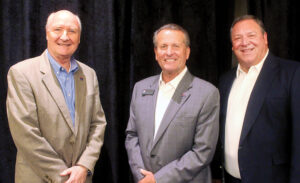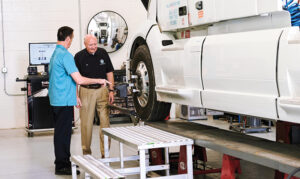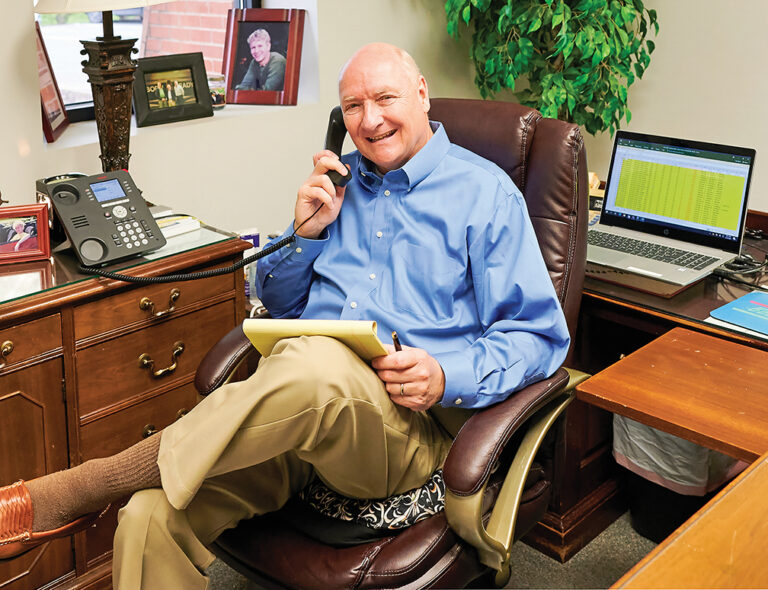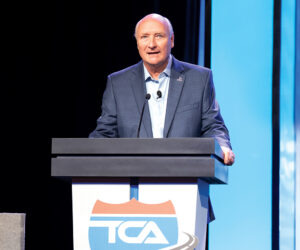Jim Ward is halfway through his term as chairman of the Truckload Carriers Association (TCA), and he’s having the time of his life. Just listen to him talk and you’ll quickly realize he’s passionate about this role. Not only is he leading the nation’s sole trade association that represents the important and vital truckload segment of the trucking industry, but he’s also been afforded the opportunity to influence decisions on key issues such as the infrastructure, the effort to come up with a highway reauthorization bill, and more — all while traveling the country and participating in important industry forums to make sure TCA’s voice is heard. Two of those forums are set to unfold this fall: In September he’ll chair Truckload 2021: Las Vegas, and in October he’ll attend the American Trucking Associations’ Management Conference and Exhibition in Nashville.
Mr. Chairman, you are now halfway through your term. Will you give us an update on how you think things are going? Also, what is on the agenda during the last half of your term?
The opportunity afforded to one in this role is amazing. You meet so many wonderful, hardworking, and caring people. It is so encouraging to hear members passionately talk about their business and speak to the challenges currently confronting them. I cannot wait until we all gather in Las Vegas to address industry opportunities and issues.
As for the upcoming months, in August I have the opportunity to address industry colleagues at the CCJ Symposium in Birmingham, Alabama. In September, we hold our 2021 annual meeting in Las Vegas, and I plan to participate in the American Trucking Associations’ Management Conference & Exhibition in Nashville in October. In November I will travel to the Bridging Border Barriers meeting in Brampton, Ontario, Canada. Then, in December my wife, Starla, and I will have the privilege to join Wendy Hamilton of Pilot Flying J, the TCA staff, and other members at Arlington National Cemetery to place wreaths delivered by some of our finest commercial drivers.
As we speak, you are in Annapolis, Maryland, for the annual officers’ retreat. What is the value of this meeting, and what are some of the discussion points on the agenda?
This is a time for the officers and staff to review the current year objectives and financials as we draw close to the fiscal year end. The 2020-21 year was extremely challenging, but I am pleased to report to the membership that the association’s financials remain in good order. Most of our time is committed to looking forward and discussing the operating plan for the next fiscal year and how best to deliver member value. We ended the meeting with clearly defined objectives and a 2021-22 budget that is certainly achievable with effort.
It is also a great opportunity for everyone, including spouses or significant others, to spend time together learning about each other’s family and interests. The TCA staff does an outstanding job preparing for and hosting the officers’ meeting. This year, Starla and I decided to have everyone see and explore a part of our beautiful state by joining us in Annapolis.

In June and July, TCA held its annual Safety & Security Meeting and Refrigerated Meeting as the organization returned to in-person meetings. What were some of the highlights of both events?
I would first like to congratulate the officers of both groups for the great job they did planning and selecting the educational offerings presented at the meetings. It was exciting to see such a great turnout at both meetings and watch the interaction and participation of those in attendance. That is what TCA is all about — education and networking!
Truckload 2021: Las Vegas, September 25-28, marks the resumption of TCA’s in-person annual convention. What are your expectations for the convention, and what would you say to members who have not yet registered for the meeting?
We anticipate a strong turnout, as members are anxious to meet again in person for face-to-face meetings. In my travels, I have heard repeatedly from membership that they are looking forward to seeing old friends and making new ones. The educational offerings, awards, speakers, and the final night’s entertainment is going to make for a great convention. I say to those who have not registered, “Come join us!”

With the number of COVID-19 cases climbing in Nevada, what will be done to ensure the safety of attendees?
Safety is always our top priority. We will continue to monitor the CDC guidelines and follow the necessary protocol. However, our goal is to see everyone in Vegas, even if we are wearing masks! We hope that is not the case.
Let’s turn to what’s on everyone’s radar — the Biden administration’s infrastructure/jobs plan. After weeks and weeks of rancor, a bipartisan bill was crafted and then blown apart by partisan dissent. A few days later, another bipartisan bill was introduced, which was passed by the Senate on August 10. What are the chances of the infrastructure plan being passed by the House?
I am not really one that focuses on chance, which is probably not the answer you were hoping to get. I will say that the discussions surrounding infrastructure have been ongoing since the new Congress has taken office, clearly representing to our industry that this country has a lot of work to do. I think we would all agree that infrastructure has become a bipartisan issue, one that seemingly everyone can and will rally around, but the devil is always in the details, which has made this such a highly debated issue.
The Fixing America’s Surface Transportation (FAST) Act expires September 30. Do you think Congress can pass a highway reauthorization bill before then, or are we headed toward another continuing resolution?

Unfortunately, the continuing resolution model has become more of the norm rather than the exception. Prior to the FAST Act passage, I believe we had 13 CRs (continuing resolutions) passed prior to reaching the final bill that our industry operates under today. September 30 clearly represents a looming deadline that hangs over the heads of Congress to address our nation’s infrastructure needs. FAST Act replacement is merely one stepping-stone to what remains a heated discussion. Added to the mix is the bipartisan infrastructure bill and the inevitable reconciliation language that could ultimately lead to yet another CR because of the politics that are surrounding this issue. We all agree our industry needs a comprehensive transportation bill that fixes our nation’s roads and bridges, shores up the Highway Trust Fund to make those fixes more sustainable over time, and discovers pathways to make the life of a professional truck driver safer and easier.
Part of the debate on any infrastructure plan is how to pay for it, and one of the ideas tossed out is the vehicle miles traveled tax. Connecticut Gov. Ned Lamont recently signed into law a bill establishing a truck-only vehicle-miles-traveled tax for his state, effective January 1, 2023. Is there any chance this law could be reversed? If not, how can the trucking industry discourage other states from following suit?
The vehicle-miles-traveled (VMT) tax is an issue TCA has been vocal about when expressing the issues that surround this form of fundraising. While it certainly represents a user fee to sustain the Highway Trust Fund, I think we would all agree that instituting this kind of program at this point in time is not beneficial for a nation that needs a serious pay-for to fund road and bridge projects. Too many question marks remain for this idea to make any real progress as a mechanism to raise dollars, and I believe the language in both the House and Senate infrastructure bills highlight the very need for this issue to be studied further.
Connecticut’s new law is not the only “truck-only VMT” language that concerns our industry. Earlier this year. Sen. John Cornyn (R-TX) suggested a truck-only VMT as a national pay-for, but that was quickly walked back. The reality is that this mechanism will be hard to enforce at the state level. Out-of-state trucking companies could end up either unknowingly not paying for it or actively avoiding it altogether, thus creating a pay-for that is destined to fail from the onset. Highway wear and tear is caused by all vehicles, not just trucks. We are happy to do our part to fix these problems, but we cannot be the only players that pay additional money into a fund that serves all road users.

A bipartisan bill was recently introduced to repeal the federal excise tax (FET) on new tractors. Similar bills have been introduced previously, with no success. Why is it important to repeal this tax, and do you think there is a chance it will pass this Congress?
On average, the FET adds approximately $21,000 to the price of a heavy-duty truck. At 12%, it represents the highest percentage rate of any excise tax levied by the federal government. As of now, more than 50% of our nation’s fleet of trucks are 10 years old or older, and our industry will need to make investments in equipment to help meet future regulatory and environmental needs. Repealing the FET would allow our industry to make a larger investment into equipment, helping to spur the economy at a time when it needs it, and also reinvest those dollars saved with the FET repeal into equipment that makes the trucks we operate safer than ever before. At a time when we have highway funding under such a microscope, it makes sense to sunset a tax that was implemented in 1917 to help fund World War I. The repeal of the FET, coupled with additional and future regulatory requirements, would go a long way toward allowing smaller fleets the opportunity to update their vehicles.
The California Trucking Association (CTA) has decided to appeal the implementation of AB5 to the U.S. Supreme Court. The Ninth Circuit Court of Appeals has granted CTA’s request for a stay until the Supreme Court decides whether it will hear the case. If the Supreme Court refuses to hear the case, the stay will likely be lifted. In the end, how much of a detriment will AB5 be to owner-operators?
That is a great question. As a nation, we should be weighing the burden that AB5, or even the PRO Act, would have on independent contractors as a whole, but also specifically for the trucking industry. As you know, most truckload carriers that operate on our roads today started out as an owner-operator with a vision. That business model has always represented our industry’s version of the American dream. In the end, if AB5 were to take hold, that dream gets further out of reach for small business owners, who have a tougher time chasing the freight that they need to survive. These types of bills that battle a decades-old business model come at a time when our industry is setting records for new motor carrier registrations. Most, if not all, of these registrations are believed to be independent contractors who seek to enter an industry with the notion that they can own their own business, grow it from the ground up, and be profitable. AB5 and its corresponding ABC test will hamper that dream.
Turning the focus now to the equipment side of the trucking industry, manufacturers are reporting an extensive backlog in the production of tractors and trailers. What do you hear from membership about how the backlog is impacting their ability to replace aging equipment?
It’s interesting that we talk about repealing the FET tax to spur new equipment sales, yet our industry is experiencing an extensive backlog of truck and trailer orders. While not breaking news, the availability of microchips remains a major issue and is causing increases in production downtime. Coupled with the rise in freight demand, carriers are looking for equipment as quickly as they can. As I understand it, this has even impacted the used truck market, driving pricing up by as much as 60% over a year ago on late model, low-mileage trucks.
TCA just announced the implementation of a comprehensive initiative promoting trucking’s image, while TCA has hit record numbers for carrier membership. Please speak to the importance of this initiative. Also, what are the reasons you feel membership is at a record high?

We are excited to see membership hitting record numbers, and there are a number of reasons we are experiencing this growth. First, our membership committee has been actively involved with TCA staff in the recruiting process. Second, the educational webinars have exposed non-members to who we are and the value we offer, encouraging their conversion. Third, the staff has improved internal processes to solicit and follow up on prospective new members using the technology purchased to facilitate improved member communication and new member growth. Finally, we have engaged LaunchIt Public Relations to assist us in getting our message out about truckload initiatives, such as Company Driver and Owner-Operator of the Year, Highway Angels, TCA Scholarship Fund recipients, TCA Profitability Program (TPP) and Best Practice Groups, etc. It’s a great story, and we just need more people to hear it!
Speaking of image, this issue of Truckload Authority recounts the heroic acts of five new Highway Angels. This brings the number of drivers honored for heroism on the highway to nearly 80 for the year. What would you say to these drivers and the hundreds of others who often risk their safety to help others?
We are forever grateful for their acts of heroism! It takes a special person to place himself or herself in harm’s way to assist another — but as you mention we have recognized a number of our commercial drivers who have come to the aid of the public this year and past. Promoting our Highway Angels is a key part of our recent announcement to inform those outside our industry of these heroic deeds. Our Highway Angels humbly provide us with real-life acts of kindness that allow us to tell our great story of being a good neighbor on our nation’s highways.
Lyndon Finney’s publishing career spans over 55 years beginning with a reporter position with the Southwest Times Record in Fort Smith, Arkansas, in 1965. Since then he’s been a newspaper editor at the Southwest Times Record, served five years as assistant managing editor of the Arkansas Democrat-Gazette in Little Rock and from November 2004 through December 2019 served as editor of The Trucker. Between newspaper jobs he spent 14 years as director of communications at Baptist Health, Arkansas’ largest healthcare system. In addition to his publishing career he served for 46 years as organist at Little Rock’s largest Baptist church.








